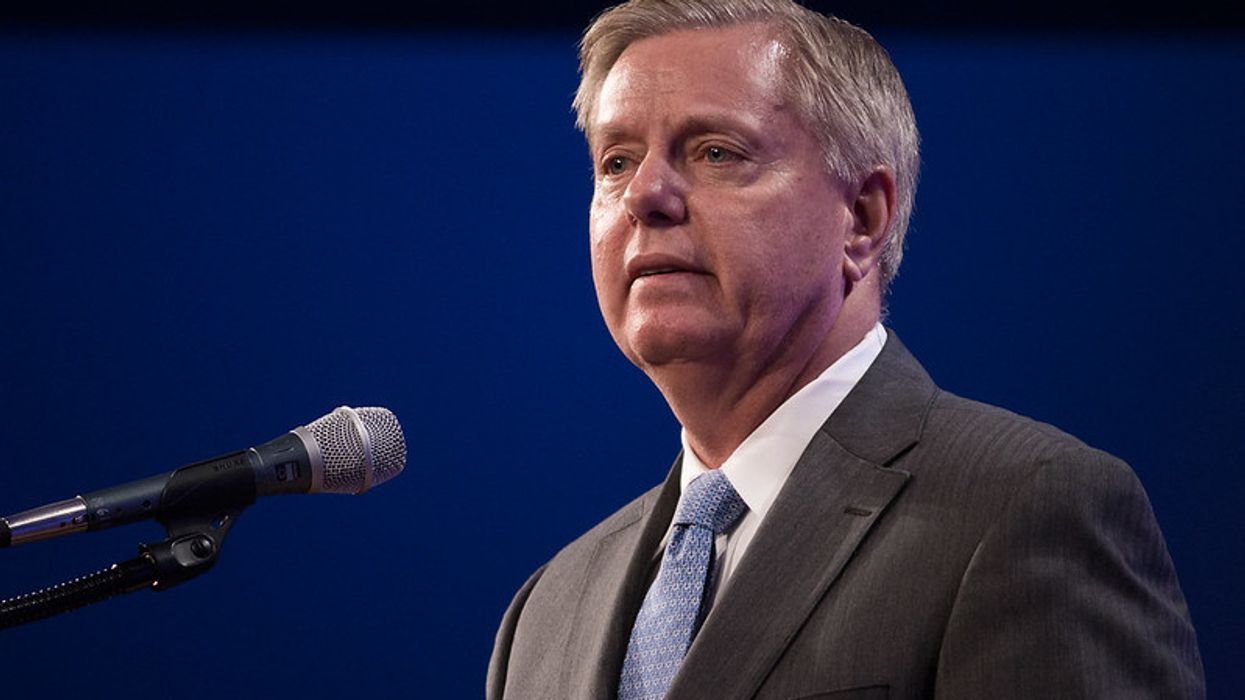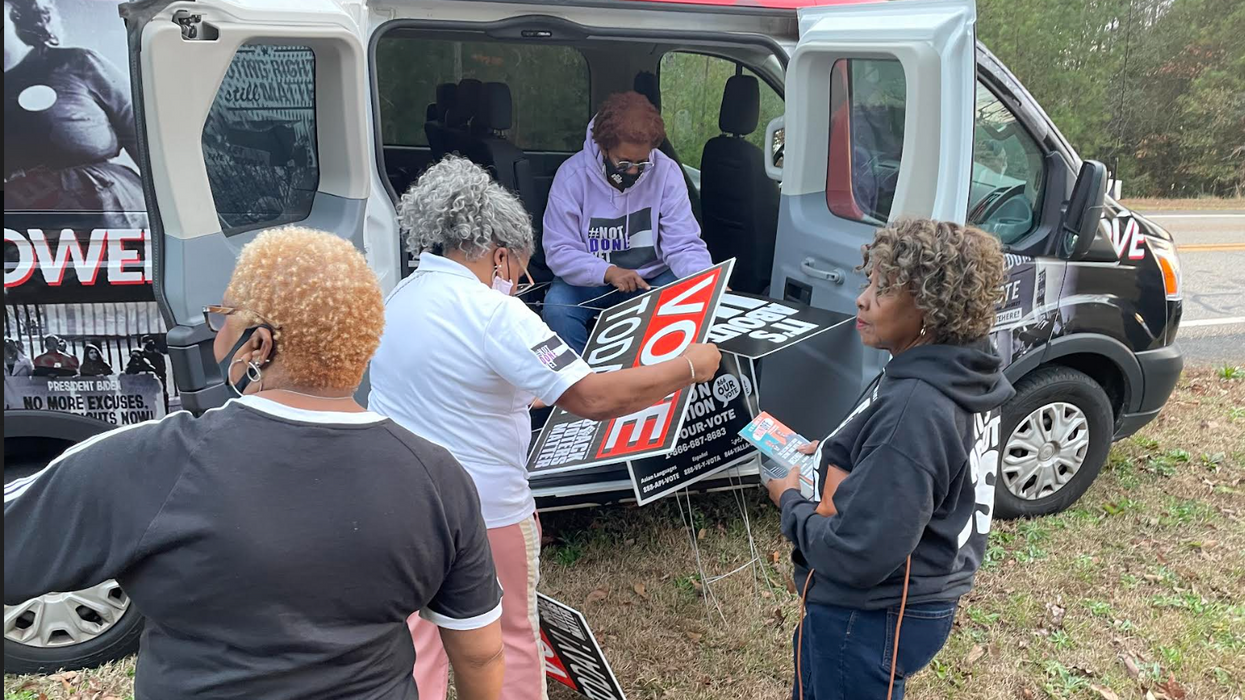Lindsey Graham Should Stop Insulting Black Voters -- And Listen To Them
One of South Carolina’s senators must have an incredibly low opinion of Black Americans, their intelligence and judgment. The evidence? His sad, almost laughable closing argument as he barnstormed for Herschel Walker, who lost his runoff race challenging Democratic incumbent Sen. Raphael Warnock and won’t be joining Lindsey Graham as a Republican colleague in Washington, D.C.
Graham did not talk about Walker’s proposals or plans for the people he would represent in the state of Georgia. He never mentioned Walker’s experience, which consisted of long-past football glory and running some businesses with a debated degree of success. In fact, Walker’s buddy barely let the candidate speak in TV appearances where Graham tried for “sidekick” but instead came off as “handler.”
No, Graham’s final arguments for the Donald Trump-endorsed Walker went something like this absurd statement he yelled more than stated on Fox News: “They’re trying to destroy Herschel to deter young men and women of color from being Republicans.”
Graham said, “If Herschel wins, he’s going to inspire people all over Georgia of color to become Republicans and, I say, all over the United States.”
No, senator. In fact, the reality turned out to be quite the opposite.
If anyone by word and deed is deterring people of color from turning to the GOP, it would be one Lindsey Graham, along with other Republican leaders, exemplified by their decision to back Walker in a contest with Warnock because, in their eyes, one Black man is the same as any other. Or at least that’s what Black voters seemed to surmise.
How else to explain the endorsement of a man so clearly unqualified and uninterested in tending to the needs of the citizens of Georgia in the Senate?
You wonder if Graham and other Republicans actually talk to Black voters about the issues they might care about — say, voting rights, health care, criminal justice reform, climate change, the economy — or if they believe that personality, not policy, drives them to the polls.
You even wonder if Republicans talked to Walker, since it was clear from his sincere concession speech on election night that there was a side of the candidate seldom revealed on the campaign trail.
And who is the “they” Graham was referring to in his emotional plea? Would that be the women who lined up at great cost to recount stories of abuse at Walker’s hands? Or maybe the candidate’s conservative activist son — the one child Walker clearly acknowledged before he was forced to own up to others — who wondered why a father with so much baggage decided to expose his loved ones to the spotlight?
For Graham to set up Walker as some kind of Pied Piper able to lure African Americans to his party was an embarrassment. Actually, “insulting” is the word I most heard from Black voters upset that Republicans would choose Walker as someone who represents what it means to be a Black man.
Did Graham, as well as Nikki Haley, Rick Scott, Ted Cruz, and Georgia Gov. Brian Kemp, notice the majority white audiences who showed up for Walker, or question why the candidate, in his few closing rallies, avoided making his case to Georgia voters of color in churches, colleges and communities?
There was a reason Walker received a tiny fraction of the Black vote in the general election. (And odds are he did not improve on those numbers in the runoff.) Most Black folks in Georgia were not buying what he and Graham were selling, a Black man spouting GOP talking points. The prospect of Walker as a rubber stamp for Sen. Mitch McConnell was not nearly as attractive as a six-year term for Warnock, someone a majority of the state’s voters obviously view as effective.
By the way, there is another senator representing South Carolina, who also campaigned for Walker, though less frequently and stridently than Graham.
No one of any race has ever questioned the character of GOP Sen. Tim Scott of South Carolina, the former state legislator and congressman with qualifications most would judge worthy when it comes to running for high office.
But in his 2014 race, Scott, who is African-American, did not fare well among Black voters. That’s presumably because of real differences in policy on issues such as voting rights and criminal justice reform.
Most Black voters looked, judged and voted on his positions, with a majority deciding to pass.
Black voters are not a monolith and never have been. As an example, my parents were conservative Republicans who eventually drew the line at GOP “Southern Strategy” race-baiting. But it’s fair to say the majority are clear-eyed when it comes to what they choose to do in the voting booth, particularly in a state such as Georgia, where that vote was won with protest and sacrifice. In Georgia, the mandated runoff when no candidate reaches 50 percent is a product of white politicians’ effort to dilute and invalidate the wishes of African Americans when they were finally allowed to exercise their rights as citizens.
The current voting restrictions backed by Gov. Kemp forced the Warnock campaign and other Democratic groups to sue to restore a Saturday of early voting. Those long lines were a sign of a healthy democracy, and also of a lack of resources in counties that need them.
Georgians overcame every obstacle.
And if the state GOP figures out a way to make each Atlanta vote count for three-fifths of any ballot from predominantly white, rural areas, Black Georgians will figure out a way around that, too. Gerrymandering and ever more restrictive voting laws won’t work forever. And touting more Herschel Walkers is certainly not the answer.
So, Sen. Graham, don’t try to anoint role models, particularly when your party has vilified the African Americans many voters of color have actually elevated, including former President Barack Obama and, yes, Raphael Warnock.
Fulfilling your dream of inspiring more people of color to support the Republican Party would mean actually listening to them — and learning a thing or two.
This week, in Georgia, the message was loud and clear.











